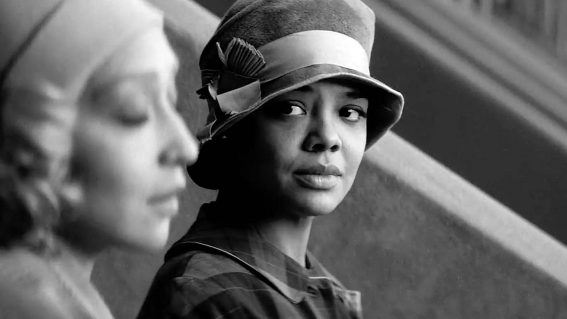Gorgeous, glossy chess drama The Queen’s Gambit is one of Netflix’s best in ages
Anya Taylor-Joy is the crown jewel in this study of addiction, loneliness and connection.
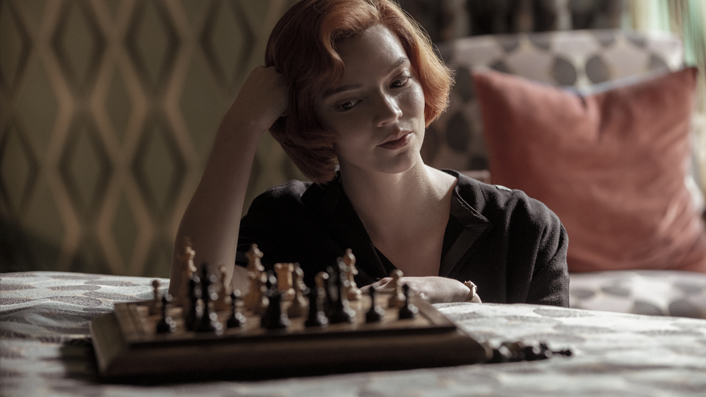
Now streaming on Netflix, new mini-series The Queen’s Gambit stars Anya Taylor-Joy as teenage chess genius Beth Harmon, whose struggles with addiction and loneliness will prove every bit as challenging as the human opponents she seeks to vanquish. It’s one of the platform’s best original productions in ages, writes Katie Parker, with a heartbreaking performance by Taylor-Joy proving she is the show’s crown jewel.
Is chess boring? For many, even those who have never really played, the answer would be yes—what, exactly, is so exciting about slowly moving a bunch of little wooden royalists around a board? Yet despite its reputation for tedium, chess features on screen surprisingly frequently. From Ingmar Bergman’s The Seventh Seal to Stanley Kubrick’s 2001: A Space Odyssey to the beloved 1997 Pixar short Geri’s Game, to New Zealand’s own acclaimed chess movie The Dark Horse, this sedate, ancient game has proven time and time again to be an unexpectedly effective element to ratchet up tension and illustrate power dynamics on screen.
See also:
* All new movies & series on Netflix
* All new streaming movies & series
In light of this, then, it is perhaps more surprising than it should be that Netflix’s new chess-centric mini series The Queen’s Gambit, is such a success and one of the platform’s best original productions in ages.

Adapted from the 1983 novel of the same name by Walter Tevis (author of The Hustler, its sequel The Color of Money and The Man Who Fell to Earth), The Queen’s Gambit begins as 9 year-old Beth Harmon (Isla Johnson) finds herself entirely alone in the world after a car crash that spares her but kills her mother. Sent to the Methuen Home for Girls, her newly discovered status as an orphan isn’t quite Dickensian levels of bad, but it is still a grim existence—and Beth, traumatised from her ordeal, doesn’t exactly love it.
Respite comes in two ways: the tranquilising “vitamins” the girls are given each day, which Beth quickly becomes dependent on, and regular games of chess with the orphanage’s janitor Mr Shaibel (Bill Camp).
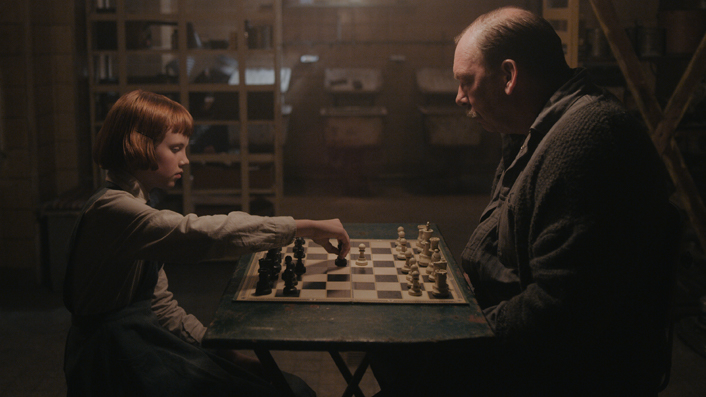
Soon, Mr Shaibel realises that Beth’s talent for the game far exceeds his own—or anyone else’s for that matter. Taking the role of mentor, he helps her take part in tournaments at the local high school, and helps her hone her talent. Soon she’s a teenager (with Anya Taylor-Joy assuming the role of older Beth) and a formidable player, spending her nights high on tranquilisers, envisioning games on her bedroom ceiling.
We follow Beth from these humble beginnings to age 22, during which time her talent (and her addictions) only grow, to the point where it seems inevitable that one will defeat the other—and she alone is the only one who can decide which.
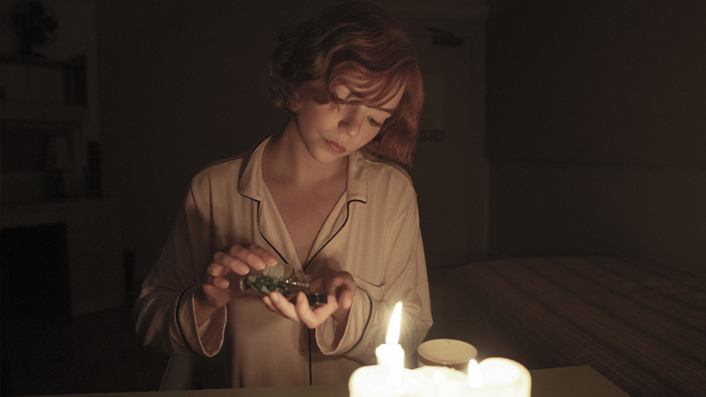
Beautifully shot and carefully, exquisitely styled, The Queen’s Gambit is a gorgeous, glossy watch, that highlights not only the glamour and elegance of the time but of the game of chess itself, with a stunning number of Beth’s games shown in great detail.
Forming interludes in the show much the same way a battle scene or a musical number might, these chess sequences may not be such a source of spectacle, but they are oddly mesmerising. Beth, whose quiet poise and grace make her such an watchable character, extends these qualities to her playing, and every tiny defeat or victory hits harder than one might expect for what is essentially a board game.
To this end, the sound design is superb: the furious ticking of the clocks, the gentle click clack of wooden figures knocking each other over, the soft, almost ASMR-esque thuds of the pieces being moved deliberately around the board, all create a spellbinding tension that even many thrillers can’t achieve.
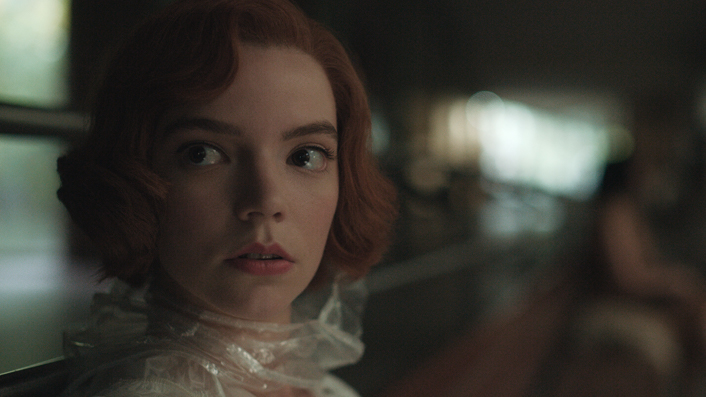
Taylor-Joy meanwhile, who has quietly been developing a formidable reputation of her own with roles in films like The Witch, Thoroughbreds, and Emma, is the show’s crown jewel. Self-destructive, self-serious and reserved, Beth, thankfully, is not just another impenetrable emotionless ice-queen, a trope so often used to illustrate troubled yet brilliant women. Instead, while deeply guarded, she is sweetly, sadly desperate for company and kinship, and Taylor-Joy is heartbreaking every time these things slip away from her once more.
Also a relief is the departure from the gritty ghastliness and outright abuse we are so used to seeing in stories about abandoned girls. The women who run the orphanage are dour, but not overly cruel; Mr Shaibel, thank god, is not a perv and takes a warm, paternal role in Beth’s life; even her fellow competitors in the male dominated chess world are, while initially vaguely condescending, ultimately kind and supportive—and not tempted to take advantage of her clear vulnerability.
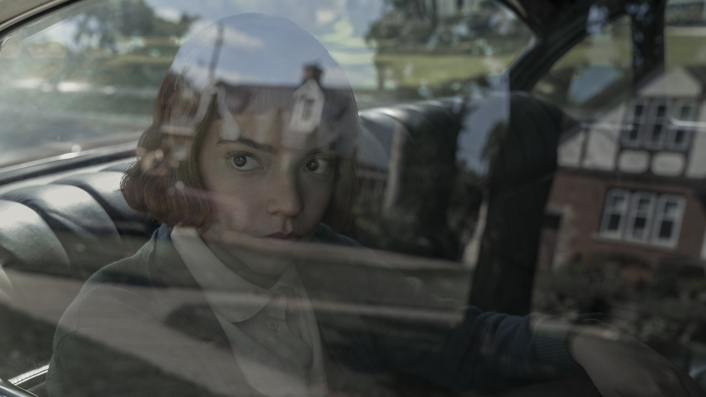
Instead Beth’s trauma—which slowly unfurls in brief flashbacks to her life prior arriving at the home—is more complex, and equally affecting, even as it remains opaque for much of the show. We need only see glimpses of her past, through the confused eyes of a child, to understand why Beth is the way she is, and why chess, a game where nothing is left to chance, would become such an obsession for her.
With seven hour-long episodes to get through, there are times when one does wish The Queen’s Gambit were a bit pacier. Even with its beautiful rendering of the games and clever distillation of the accompanying tension, the chess sequences don’t always advance the plot, and this lack of constant forward momentum does make it a bit less bingeable than viewers might be used to.
But binging isn’t the only way to watch things, and for Netflix especially, The Queen’s Gambit is a refreshing chance from the frenzied onslaught of action that characterises much of their fare. Slow, steady and measured, much like chess itself, it is a richly imagined and beautifully told story that creeps up on you—I didn’t know how involved I was until I found myself bawling at the final episode. A rare and lovely study of addiction, loneliness and connection, The Queen’s Gambit is worth every moment—and proves that, on-screen anyway, chess is far from boring.














